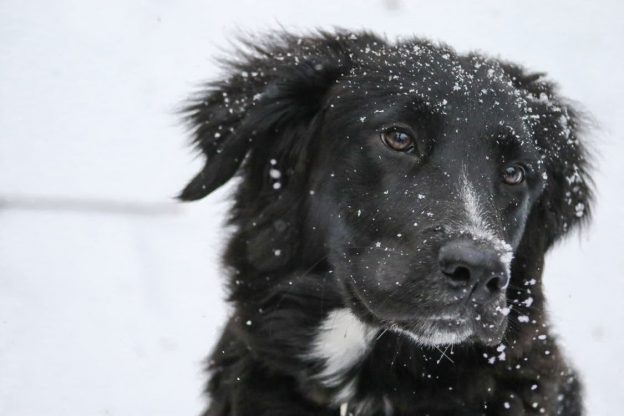Brrrrr, its cold outside! As winter approaches and temperatures drop, it’s more important than ever that we’re looking out for our pets.
Wrap up warm!
Falling temperatures can be a serious hazard for pets – especially those who aren’t built to withstand the cold. Although frostbite and hypothermia is relatively uncommon, it can still happen!
Cats and thinly coated dogs, or those that are elderly or unwell, can be more risk from falling temperatures; make sure they’re safely inside when the weather gets cold and snowy. Investing in a dog or cat bed that is either raised or has sides with a warm blanket can help keep pets away from drafts. If your dog spends a lot of time outdoors, it might be worth purchasing a coat or fleece to keep them as insulated as possible when out and about.
Smaller pets such as guinea pigs and rabbits can be particularly vulnerable to colder temperatures. Make sure outdoor hutches are positioned so that rain and snow is unable to blow in. You could also partially cover hutches with a thick blanket, for extra warmth. If weather conditions are set to drop considerably, it would be worth bringing your pets’ hutch indoors or in a shed or garage for the duration of the bad weather.
Protect those paws!
Cold snow and ice can be uncomfortable to paws. Make sure to wash and completely dry your pet’s paws and underside after time outside, especially if they came into contact with any salt or chemical de-icer that could make your pet sick if they licked their paws.
Watch out for anti-freeze!
Anti-freeze is a huge hazard for pets in winter. It can often be found dripping from car radiators and even the smallest amount can be poisonous. Cats are particularly at risk due to its sweet taste and a cat’s freedom to roam the neighbourhood. Ensure you keep your dog on leads in areas where cars may have been to stop your pet from wandering and drinking from an anti-freeze laced puddle.
Symptoms of antifreeze poisoning in cats and dogs can include ‘drunken’ like behaviour, vomiting and seizures. If you suspect your pet is suffering from anti-freeze poisoning, seek help and advice from your local vets as soon as possible.
Check your cars!
Even the wariest of cats often seek warmth and shelter under vehicle hoods during the colder months, enticed by the heat from engines after cars have been parked. Needless to say, this could end very badly. Make sure you tap your car bonnet before starting the engine to encourage those hiding to move out of the way.
Visibility first!
As it becomes darker earlier during the winter; it may be worth investing in a reflective collar for your pet, so that they can be easily spotted by drivers when out and about. For dogs, you could also consider reflective leads and jackets, to ensure they’re easily visible on evening walks. Make sure you think about reflective clothing for yourself too!
Ponds and Lakes
Make sure you keep your dog away from lakes and rivers that are iced over as thin ice can break under the weight of a dog with disastrous consequences.
If you have a fish pond, ensure you check it every day for ice to prevent a build-up of toxic gases. If your pond does ice over, do not break the ice with force as it can harm fish. Instead you could hold a saucepan of hot water on the surface to melt a hole in the ice. Long term, why not invest in a floating pond de-icer to ensure there is always at least a small area free of ice.

